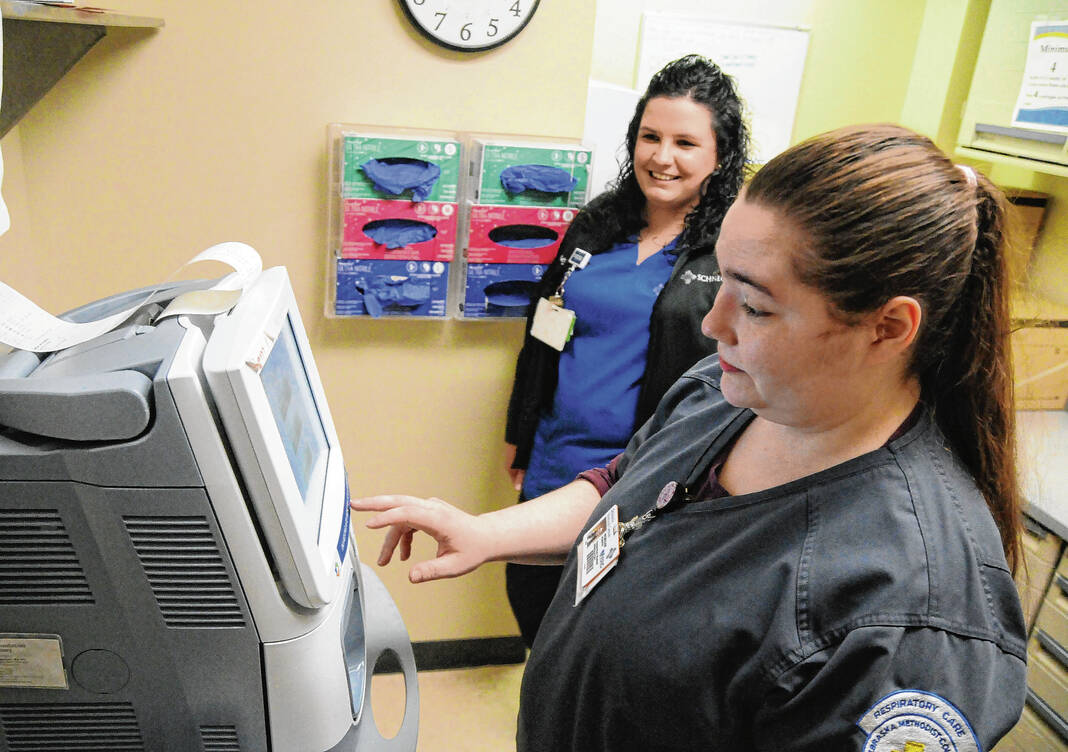
Morgan Murphy, foreground, is a respiratory therapy student at Schneck Medical Center in Seymour, and Brittaney Haynes is the disease management patient care supervisor for respiratory and sleep services.
Zach Spicer | The Tribune
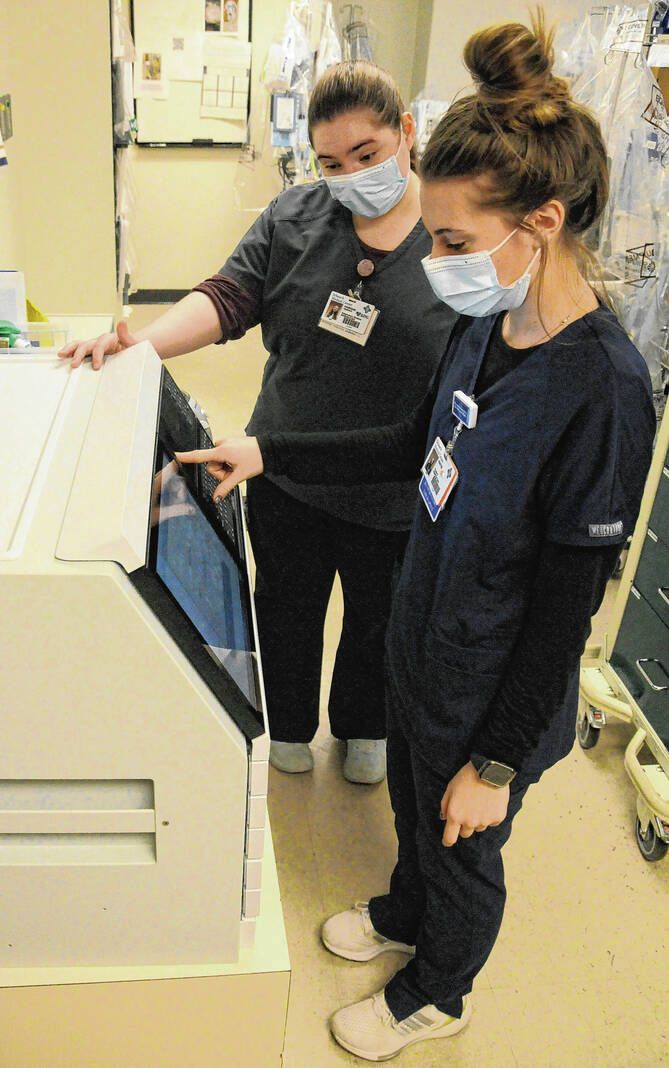
Kaitie Taggart, foreground, and Morgan Murphy use a machine to order patient medications.
Zach Spicer | The Tribune
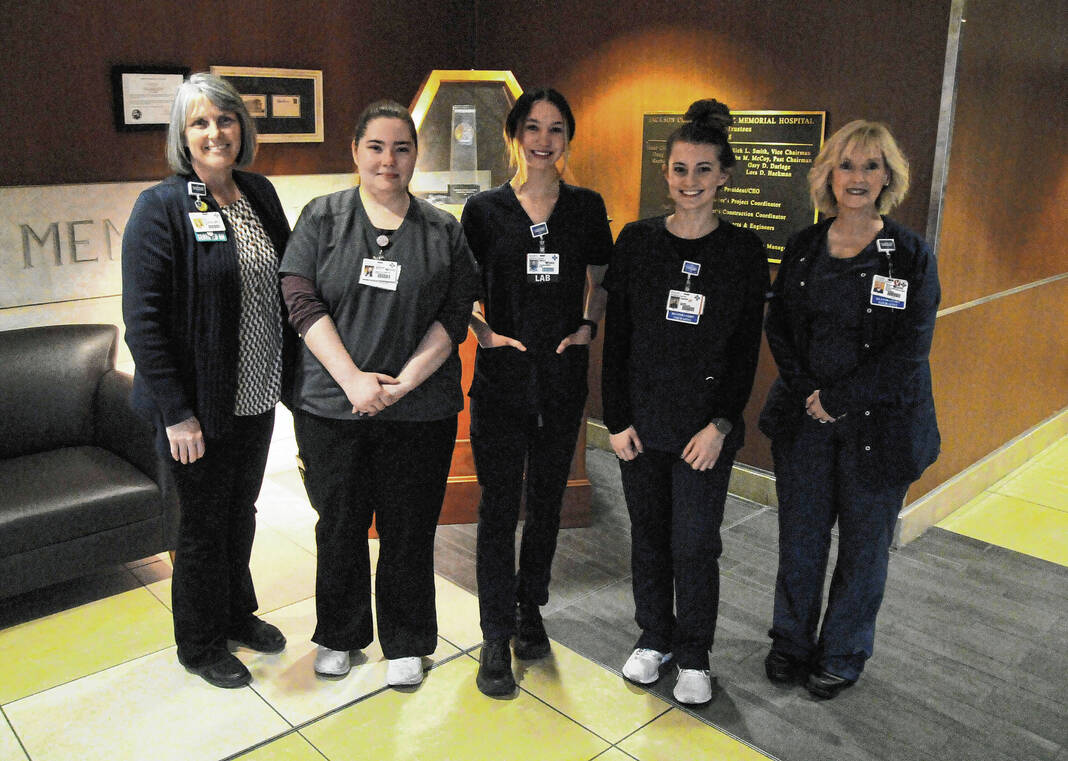
Standing inside Schneck Medical Center in Seymour are, from left, Amy Pettit, vice president of patient care services and chief nursing officer; respiratory therapy students Morgan Murphy, Emily Corcoran and Kaitie Taggart; and Susan Wynn, director of respiratory and sleep services.
Zach Spicer | The Tribune
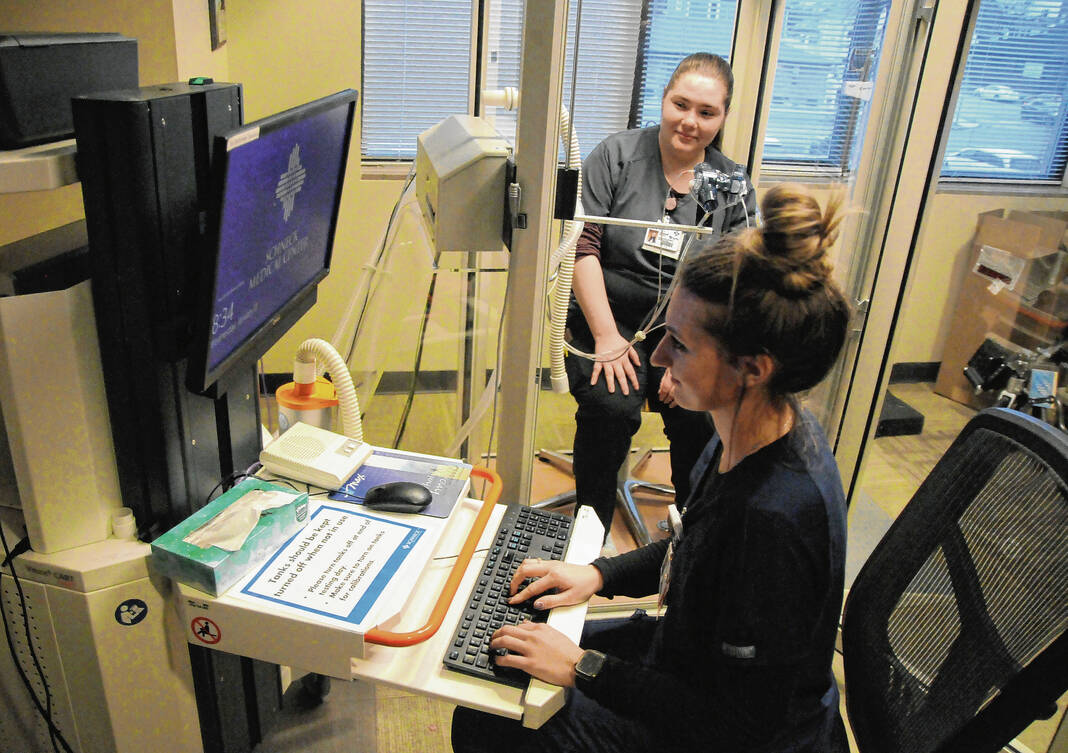
Kaitie Taggart, foreground, signs into a computer as Morgan Murphy sits in a body box that’s used to do a pulmonary function test. Both are respiratory therapy students at Schneck Medical Center in Seymour.
Zach Spicer | The Tribune
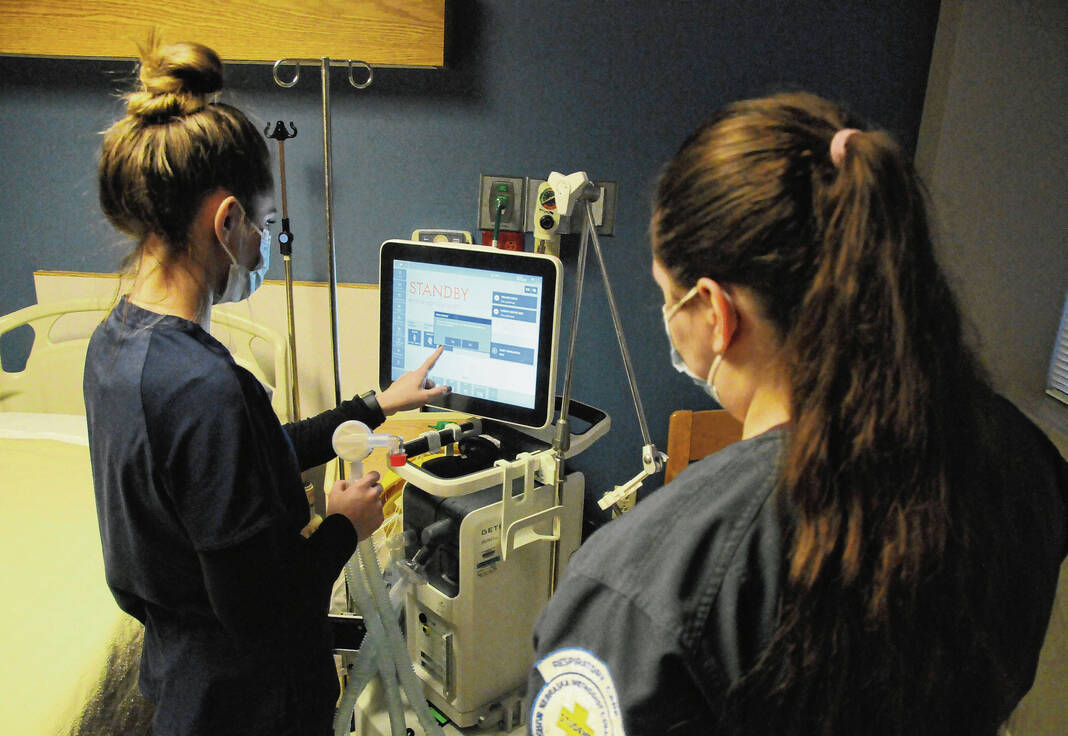
Kaitie Taggart, left, and Morgan Murphy start up a ventilator.
Zach Spicer | The Tribune
Morgan Murphy was working in patient financial services at Schneck Medical Center.
During the COVID-19 pandemic, she was asked to help in another area of the Seymour hospital and said she fell in love with working with people.
One day, she received an email about a new tuition assistance program offering in respiratory therapy, where she could work at Schneck while taking classes through Nebraska Methodist College for 12 months.
In the end, she could earn an Associate of Science in respiratory care, take her boards to become a licensed respiratory therapist and continue to work at the hospital.
The kicker? It all comes at no cost to her.
“It’s a phenomenal opportunity,” said the 2015 Seymour High School graduate, who already has a bachelor’s degree in English.
“I went to college once, and I have just a mound of debt from it,” she said. “This way, you don’t have that debt. I still have my income, so I can still be at home not panicking how I’m going to make ends meet. I can focus on my studying, and on top of that, I work with the people that I’m going to be working with when I graduate, so I’m being introduced into the atmosphere already.”
In May, she will be Schneck’s first respiratory student to complete the unique program.
“It is a yearlong process, so it is rigorous, but it’s absolutely doable,” Murphy said. “I think it’s like any health care field. You’ve got to push yourself a little bit.”
Now, hospital officials are looking for people to follow in Murphy’s footsteps and apply to the program so they, too, can become a respiratory therapist.
An RT is a specialized health care professional who is trained with a focus in pulmonary medicine to work therapeutically with people who have lung or lung-related diseases or conditions.
A typical day as an RT is never predictable, as they treat patients of all ages in all areas of the hospital setting. They work in the emergency department, critical care units, surgical areas, medical/surgical units, trauma and burn units, basically wherever patients are breathing or not breathing.
They also do ventilator care, draw and analyze blood, oxygen therapy, medication delivery via breathing treatments with nebulizers or inhalers and consultations, education and patient assessments. They also may be members of CODE teams or collaborative teams that work to continually improve quality patient care.
Susan Wynn, director of respiratory and sleep services for Schneck, said she’s seeking applicants for the RT program because there continues to be a shortage of RTs.
According to the American Association for Respiratory Care, there are three major factors that have resulted in the current shortage: A high rate of RTs reaching retirement age, RTs leaving the profession because of job dissatisfaction and burnout and far fewer students pursuing careers in the respiratory therapy field.
“Since the pandemic, it has been hard to get health care staffing. Everywhere has that problem,” Wynn said. “We need therapists so desperately. It’s a good career, and people like the job.”
Schneck has had a tuition assistance program for a while, but since the pandemic, it added respiratory therapy as one of its options for people to go back to school while working at the hospital. There are limited spots available for the next cohort that will begin taking classes through Nebraska Methodist College in May.
“They have to go through the application process,” Wynn said. “Once they are chosen, (Schneck pays) them full-time hours like they have a full-time job, but they go to school full time. Then when they’re done, they have to work a couple years at Schneck.”
Those interested in applying must have completed or be able to complete prerequisites — including English, math, chemistry, physics and microbiology — before classes start in May. Wynn said Ivy Tech Community College classes start Tuesday, and that’s an option for those who need to take a prerequisite.
She and Director of Human Resources Julie Warren will review the applications and decide who to interview.
“We want to pick people that we feel are going to be successful, so we do look at grades and see if we think they are going to make it because it’s a tough course and it’s a fast course because it’s a year long once you’ve got prerequisites,” Wynn said. “It’s a lot of physics, chemistry, physiology, stuff that you have to pass to be able to get through.”
Students accepted into the program will do the NMC online classes four days a week and do their clinicals at Schneck.
“Because they are employees of the hospital, they have to work six shifts every quarter,” Wynn said. “It’s a free way to go to school. Plus, you get paid full time. It’s a win-win, and it’s such a good deal. You owe nothing when you’re out of school. Your school is paid for.”
Emily Corcoran, a 2019 SHS graduate, is finishing her prerequisites and working as a phlebotomist in the Schneck lab and plans to start with the RT cohort in May.
She already has an associate degree from Ivy Tech and originally wanted to become a nurse, but she changed to RT because she wanted to be in a specialty.
Not having debt after school and having a career after she graduates drew her to apply for the RT program.
“What drew me to Schneck was that it was local, they are helping you out with everything and it just fit perfect,” Corcoran said. “I’m just excited for the fast pace and to get done pretty quick and start working.”
Kaitie Taggart, a 2018 Brownstown Central High School graduate, is a step ahead of Murphy and Corcoran, as she graduated from Ivy Tech in December and is waiting to take her state boards to be a licensed RT.
She said it’s great that Schneck offers opportunities to pay for tuition.
“I was able to work as a student while I was in school, and that was really beneficial so I had an idea of what to do when I graduated,” Taggart said. “I have a couple grandparents that have things like COPD that really benefit from working as a respiratory therapist, and I’m just really excited to work at Schneck and get in a routine.”
Amy Pettit, vice president of patient care services and chief nursing officer for Schneck, said when she was going through school, she had to work full time in order to pay her bills, so it was like doing full-time jobs.
With the RT program, students only have to work the six 12-hour shifts per quarter, so they are able to focus on their education, she said.
“You are working less, you’re spending more time dedicated to studying, dedicated to your classes,” Pettit said. “We want you to focus on your education, get it done as quickly as you can but make the best grades that you can, too. We want you to learn as much as you can while you’re there. Then in addition to that, we will pay for your tuition.”
